- Home
- Leigh Bardugo
Ruin and Rising Page 3
Ruin and Rising Read online
Page 3
* * *
GENYA WAS WAITING for me in the Kettle, the vast, almost perfectly round cavern that provided food for all those in the White Cathedral. Its curved walls were studded with stone hearths, reminders of Ravka’s ancient past that the kitchen staff liked to complain weren’t nearly as convenient as the cookstoves and tile ovens above. The giant spits had been made for large game, but the cooks rarely had access to fresh meat. So instead they served salt pork, root vegetable stews, and a strange bread made from coarse gray flour that tasted vaguely of cherries.
The cooks had nearly gotten used to Genya, or at least they didn’t cringe and start praying when they saw her anymore. I found her keeping warm at a hearth on the Kettle’s far wall. This had become our spot, and the cooks left a small pot of porridge or soup there for us every day. As I approached with my armed escort, Genya let her shawl drop away, and the guards flanking me stopped short. She rolled her remaining eye and gave a catlike hiss. They dropped back, hovering by the entrance.
“Too much?” she asked.
“Just enough,” I replied, marveling at the changes in her. If she could laugh at the way those oafs reacted to her, it was a very good sign. Though the salve David had created for her scars had helped, I was pretty sure most of the credit belonged to Tamar.
For weeks after we’d arrived at the White Cathedral, Genya had refused to leave her chambers. She simply lay there, in the dark, unwilling to move. Under the supervision of the guards, I’d talked to her, cajoled her, tried to make her laugh. Nothing had worked. In the end, it had been Tamar who lured her out into the open, demanding that she at least learn to defend herself.
“Why do you even care?” Genya had muttered to her, pulling the blankets up.
“I don’t. But if you can’t fight, you’re a liability.”
“I don’t care if I get hurt.”
“I do,” I’d protested.
“Alina needs to watch her own back,” Tamar said. “She can’t be looking after you.”
“I never asked her to.”
“Wouldn’t it be nice if we only got what we asked for?” Tamar said. Then she’d pinched and prodded and generally harassed, until finally Genya had thrown off her covers and agreed to a single combat lesson—in private, away from the others, with only the Priestguards as audience.
“I’m going to flatten her,” she’d grumbled to me. My skepticism must have been evident, because she’d blown a red curl off her scarred forehead and said, “Fine, then I’ll wait for her to fall asleep and give her a pig nose.”
But she’d gone to that lesson and the next one, and as far as I knew, Tamar hadn’t woken up with a pig nose or with her eyelids sealed shut.
Genya continued to keep her face covered and spent most of her time in her chamber, but she no longer hunched, and she didn’t shy away from people in the tunnels. She’d made herself a black silk eye patch from the lining of an old coat, and her hair was looking distinctly redder. If Genya was using her power to alter her hair color, then maybe some of her vanity had returned, and that could only mean more progress.
“Let’s get started,” she said.
Genya turned her back to the room, facing the fire, then drew her shawl over her head, keeping the fringed sides spread wide to create a screen that would hide us from prying eyes. The first time we’d tried this, the guards had been on us in seconds. But as soon as they’d seen me applying the salve to Genya’s scars, they’d given us distance. They considered the wounds she bore from the Darkling’s nichevo’ya some kind of divine judgment. For what, I wasn’t sure. If Genya’s crime was siding with the Darkling, then most of us had been guilty of it at one time or another. And what would they say to the bite marks on my shoulder? Or the way I could make shadows curl?
I took the tin from my pocket and began applying salve to her wounds. It had a sharp green scent that made my eyes water.
“I never realized what a pain it is to sit still this long,” she complained.
“You’re not sitting still. You’re wriggling around.”
“It itches.”
“How about I jab you with a tack? Will that distract you from the itching?”
“Just tell me when you’re done, you dreadful girl.” She was watching my hands closely. “No luck today?” she whispered.
“Not so far. There are only two hearths going, and the flames are low.” I wiped my hand on a grubby kitchen towel. “There,” I said. “Done.”
“Your turn,” she said. “You look—”
“Terrible. I know.”
“It’s a relative term.” The sadness in her voice was unmistakable. I could have kicked myself.
I touched my hand to her cheek. The skin between the scars was smooth and white as the alabaster walls. “I’m an ass.”
The corner of her lip pulled crookedly. Almost a smile. “On occasion,” she said. “But I’m the one who brought it up. Now be quiet and let me work.”
“Just enough so that the Apparat lets us keep coming here. I don’t want to give him a pretty little Saint to show off.”
She sighed theatrically. “This is a violation of my most core beliefs, and you will make it up to me later.”
“How?”
She cocked her head to one side. “I think you should let me make you a redhead.”
I rolled my eyes. “Not in this lifetime, Genya.”
As she began the slow work of altering my face, I fiddled with the tin in my fingers. I tried to fit the lid back on, but some part of it had come loose from beneath the salve. I lifted it with the tips of my fingernails—a thin, waxy disc of paper. Genya saw it at the same time I did.
Written on the back, in David’s nearly illegible scrawl, was a single word: today.
Genya snatched it from my fingers. “Oh, Saints. Alina—”
That was when we heard the stomp of heavy-booted feet and a scuffle outside. A pot hit the ground with a loud clang, and a shriek went up from one of the cooks as the room flooded with Priestguards, rifles drawn, eyes seeming to blaze holy fire.
The Apparat swept in behind them in a swirl of brown robes. “Clear the room,” he bellowed.
Genya and I shot to our feet as the Priestguards roughly herded the cooks from the kitchen in a confusion of protests and frightened exclamations.
“What is this?” I demanded.
“Alina Starkov,” said the Apparat, “you are in danger.”
My heart was hammering, but I kept my voice calm. “Danger from what?” I asked, glancing at the pots boiling in the hearths. “Lunch?”
“Conspiracy,” he proclaimed, pointing at Genya. “Those who would claim your friendship seek to destroy you.”
More of the Apparat’s bearded henchmen marched through the door behind him. When they parted ranks, I saw David, his eyes wide and frightened.
Genya gasped and I laid a hand on her arm to keep her from charging forward.
Nadia and Zoya were next, both with wrists bound to prevent them from summoning. A trickle of blood leaked from the corner of Nadia’s mouth, and her skin was white beneath her freckles. Mal was with them, his face badly bloodied. He was clutching his side as if cradling a broken rib, his shoulders hunched against the pain. But worse was the sight of the guards who flanked him—Tolya and Tamar. Tamar had her axes back. In fact, they were both armed as thoroughly as the Priestguards. They would not meet my eyes.
“Lock the doors,” the Apparat commanded. “We will have this sad business done in private.”
CHAPTER
2
THE KETTLE’S MASSIVE DOORS slammed shut, and I heard the lock turn. I tried to put aside the sick twist in my gut and make sense of what I was seeing. Nadia and Zoya—two Squallers—Mal, and David, a harmless Fabrikator. Today, the note had said. What had it meant?
“I’ll ask you again, priest. What is this? Why are my friends in custody? Why are they bleeding?”
“These are not your friends. A plot has been discovered to bring the White Cathedral down aroun
d our very ears.”
“What are you talking about?”
“You saw the boy’s insolence today—”
“Is that the problem? He doesn’t tremble properly in your presence?”
“The issue here is treason!” He drew a small canvas pouch from his robes and held it out, letting it dangle from his fingers. I frowned. I’d seen pouches like that in the Fabrikator workshops. They were used for—
“Blasting powders,” the Apparat said. “Made by this Fabrikator filth with materials gathered by your supposed friends.”
“So David made blasting powders. There could be a hundred reasons for that.”
“Weapons are forbidden within the White Cathedral.”
I arched a brow at the rifles currently pointed at Mal and my Grisha. “And what are those? Ladles? If you’re going to make accusations—”
“Their plans were overheard. Stand forward, Tamar Kir-Bataar. Speak the truth you’ve discovered.”
Tamar bowed deeply. “The Grisha and the tracker planned to drug you and take you to the surface.”
“I want to return to the surface.”
“The blasting powders would have been used to ensure that no one followed,” she continued, “to bring down the caverns on the Apparat and your flock.”
“Hundreds of innocent people? Mal would never do that. None of them would.” Not even Zoya, that wretch. “And it doesn’t make any sense. Just how were they supposed to drug me?”
Tamar nodded to Genya and the tea that sat beside us.
“I drink that tea myself,” Genya snapped. “It isn’t laced with anything.”
“She is an accomplished poisoner and liar,” Tamar replied coldly. “She has betrayed you to the Darkling before.”
Genya’s fingers clenched around her shawl. We both knew there was truth in the charge. I felt an unwelcome prickle of suspicion.
“You trust her,” Tamar said. There was something strange in her voice. She sounded less like she was issuing an accusation than a command.
“They were only waiting to stockpile enough blasting powder,” said the Apparat. “Then they intended to strike, to take you aboveground and give you up to the Darkling.”
I shook my head. “You really expect me to believe that Mal would hand me over to the Darkling?”
“He was a dupe,” said Tolya quietly. “He was so desperate to free you that he became their pawn.”
I glanced at Mal. I couldn’t read his expression. The first real sliver of doubt entered me. I’d never trusted Zoya, and how well did I really know Nadia? Genya—Genya had suffered so much at the Darkling’s hand, but their ties ran deep. Cold sweat broke out on my neck, and I felt panic pull at me, fraying my thoughts.
“Plots within plots,” hissed the Apparat. “You have a soft heart, and it has betrayed you.”
“No,” I said. “None of this makes sense.”
“They are spies and deceivers!”
I pressed my fingers to my temples. “Where are my other Grisha?”
“They have been contained until they can be properly questioned.”
“Tell me they are unharmed.”
“See this concern for those who would wrong her?” he asked of the Priestguards. He’s enjoying this, I realized. He’s been waiting for it. “This is what marks her kindness, her generosity.” His gaze locked on mine. “There are some injuries, but the traitors will have the best of care. You need only say the word.”
The warning was clear, and finally I understood. Whether the Grisha plot was real or some subterfuge invented by the priest, this was the moment he had been hoping for, the chance to make my isolation complete. No more visits to the Kettle with Genya, no more stolen conversation with David. The priest would use this chance to separate me from anyone whose loyalties were tied more tightly to me than his cause. And I was too weak to stop him.
But was Tamar telling the truth? Were these allies really enemies? Nadia hung her head. Zoya kept her chin lifted, her blue eyes bright with challenge. It was easy to believe that either or both of them might turn against me, might seek the Darkling out and offer me as a gift with some hope of clemency. And David had helped to place the collar around my neck.
Could Mal have been tricked into helping them betray me? He didn’t look frightened or concerned—he looked the way he had at Keramzin when he was about to do something that got us both in trouble. His face was bruised, but I noticed he was standing straighter. And then he glanced up, almost as if he were casting his eyes heavenward, as if he were praying. I knew better. Mal had never been the religious sort. He was looking at the master flue.
Plots within plots. David’s nervousness. Tamar’s words. You trust her.
“Release them,” I commanded.
The Apparat shook his head, his expression full of sorrow. “Our Saint is being weakened by those who claim to love her. See how frail she is, how sickly. This is the corruption of their influence.” A few of the Priestguards nodded, and I saw that strange fanatical light in their eyes. “She is a Saint, but also a young girl governed by emotion. She does not understand the forces at work here.”
“I understand that you have lost your way, priest.”
The Apparat gave me that pitying, indulgent smile. “You are ill, Sankta Alina. Not in your right mind. You do not know friend from foe.”
Goes with the territory, I thought bleakly. I took a deep breath. This was the moment to choose. I had to believe in someone, and it wasn’t the Apparat, a man who had betrayed his King, then betrayed the Darkling, who I knew would gladly orchestrate my martyrdom if it served his purpose.
“You will release them,” I repeated. “I will not warn you again.”
A smirk flickered over his lips. Behind the pity, there was arrogance. He was perfectly aware of how weak I was. I had to hope the others knew what they were doing.
“You will be escorted to your chambers so that you may spend the day in solitude,” he said. “You will think on what has happened, and good sense will return. Tonight we will pray together. For guidance.”
Why did I suspect that “guidance” meant the location of the firebird and possibly any information I had on Nikolai Lantsov?
“And if I refuse?” I asked, scanning the Priestguards. “Will your soldiers take up arms against their Saint?”
“You will remain untouched and protected, Sankta Alina,” said the Apparat. “I cannot extend the same courtesy to those you would call friends.”
More threats. I looked into the guards’ faces, their fervent eyes. They would murder Mal, kill Genya, lock me in my chambers, and feel righteous in the act.
I took a small step back. I knew the Apparat would read it as a sign of weakness. “Do you know why I come here, priest?”
He gave a dismissive wave, his impatience showing through. “It reminds you of home.”
My eyes met Mal’s briefly. “You should know by now,” I said, “an orphan has no home.”
I twitched my fingers in my sleeves. Shadows surged up the Kettle walls. It wasn’t much of a distraction, but it was enough. The Priestguards startled, rifles swinging wildly, as their Grisha captives recoiled in shock. Mal didn’t hesitate.
“Now!” he shouted. He shot forward, snatching the blasting powder from the Apparat’s hand.
Tolya threw out his fists. Two of the Priestguards crumpled, clutching their chests. Nadia and Zoya held up their hands, and Tamar spun, her axes slicing through their bonds. Both Squallers raised their arms, and wind rushed through the room, lifting the sawdust on the floor.
“Seize them!” yelled the Apparat. The guards sprang into action.
Mal hurled the pouch of powder into the air. Nadia and Zoya lobbed it higher, up into the master flue.
Mal slammed into one of the guards. The broken ribs must have been an act, because there was nothing tentative in his movements now. A fist, a thrown elbow. The Priestguard went down. Mal grabbed his pistol and aimed high, up into the flue, into darkness.
This w
as the plan? No one could make that shot.
Another guard threw himself at Mal. Mal pivoted from his grasp and fired.
For a moment, there was a hush, suspended silence, and then high above us, I heard it: a dampened boom.
A roaring sound rushed toward us. A cloud of soot and rubble billowed from the flue above.
“Nadia!” cried Zoya, who was grappling with a guard.
Nadia arced her arms and the cloud hovered, twisted, siphoned into the shape of a whirling column. It spun away and collapsed to the floor in a harmless clatter of pebbles and dirt.
I took all of this in dimly—the fighting, the Apparat’s shouts of rage, the grease fire that had broken out against the far wall.
Genya and I had come to the kitchens for one reason alone: the hearths. Not for the heat or for any sense of comfort, but because each of those ancient hearths led to the master flue. And that flue was the only place in the White Cathedral with direct access to the surface. Direct access to the sun.
“Strike them down!” the Apparat shouted at his Priestguards. “They’re trying to kill our Saint! They’re trying to kill us all!”
I’d come here every day, hoping the cooks might use more than a few fires so that the flue would open all the way. I’d tried to summon, hidden from the Priestguards by Genya’s thick shawl and their superstitious fear of her. I’d tried and failed. Now Mal had blown the flue wide open. I could only call and pray that the light would answer.
I felt it, miles above me—so tentative, barely a whisper. Panic gripped me. The distance was too great. I’d been foolish to hope.
Then it was as if something within me rose and stretched, like a creature that had lain idle for too long. Its muscles had gone soft from disuse, but it was still there, waiting. I called and the light answered with the strength of the antlers at my throat, the scales at my wrist. It came to me in a rush, triumphant and eager.
I grinned at the Apparat, letting exultation fill me. “A man so obsessed with holy fire should pay more attention to the smoke.”
The light slammed through me and burst over the room in a blinding cascade that illuminated the almost comical expression of shock on the Apparat’s face. The Priestguards threw up their hands, eyes squeezed shut against the glare.

 The Language of Thorns: Midnight Tales and Dangerous Magic
The Language of Thorns: Midnight Tales and Dangerous Magic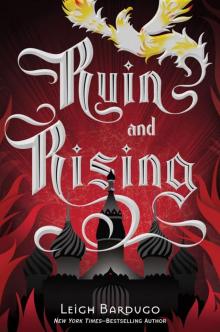 Ruin and Rising
Ruin and Rising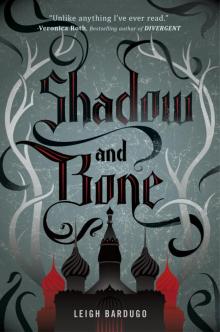 Shadow and Bone
Shadow and Bone The Demon in the Wood
The Demon in the Wood King of Scars
King of Scars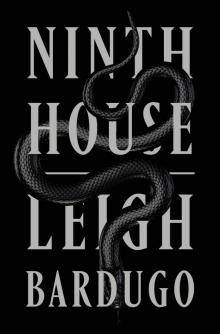 Ninth House
Ninth House Six of Crows
Six of Crows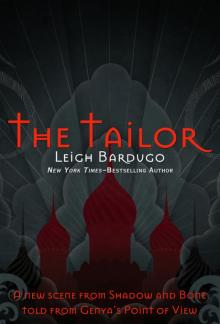 The Tailor
The Tailor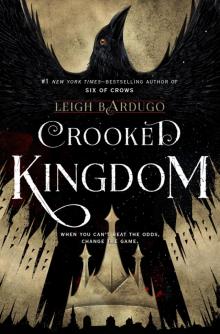 Crooked Kingdom
Crooked Kingdom The Too-Clever Fox
The Too-Clever Fox The Witch of Duva
The Witch of Duva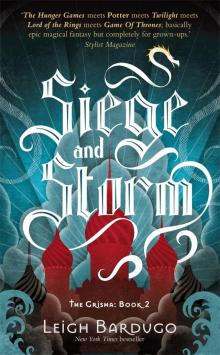 Siege and Storm
Siege and Storm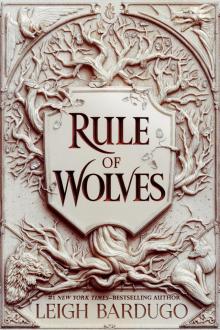 Rule of Wolves
Rule of Wolves Little Knife
Little Knife Grishaverse 01 - Shadow and Bone
Grishaverse 01 - Shadow and Bone The Lives of Saints
The Lives of Saints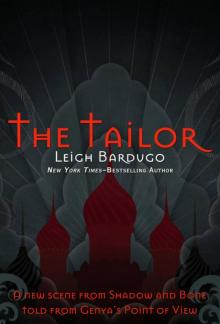 Grishaverse 01.5 - The Tailor
Grishaverse 01.5 - The Tailor Grishaverse 0.5 - The Language of Thorns
Grishaverse 0.5 - The Language of Thorns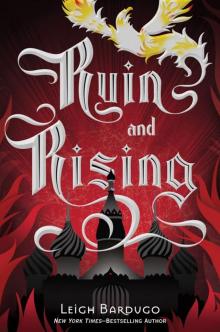 Ruin and Rising (The Grisha Trilogy)
Ruin and Rising (The Grisha Trilogy)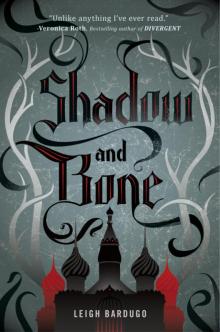 Shadow and Bone gt-1
Shadow and Bone gt-1 Wonder Woman: Warbringer
Wonder Woman: Warbringer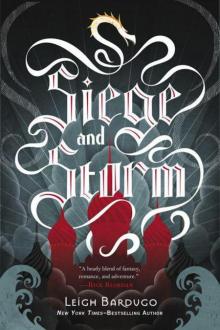 Grisha 02 - Siege and Storm
Grisha 02 - Siege and Storm The Language of Thorns
The Language of Thorns Grisha 00: The Witch of Duva
Grisha 00: The Witch of Duva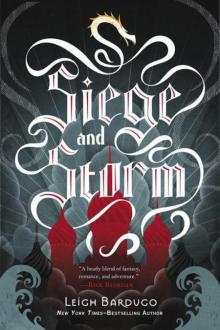 Siege and Storm gt-2
Siege and Storm gt-2 Shadow and Bone (Grisha Trilogy)
Shadow and Bone (Grisha Trilogy)